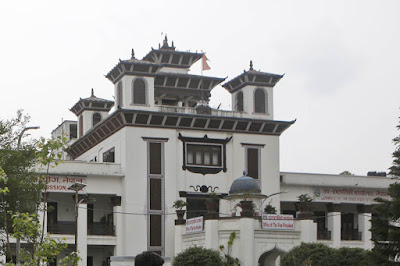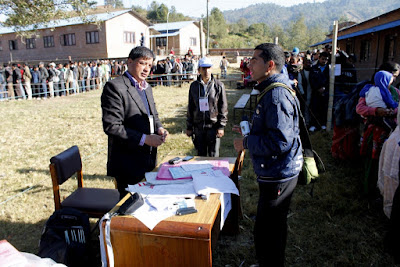Election process in Nepal
Election is considered the backbone of democracy and Nepal is a democratic country. Elections for the national and regional parliaments and local bodies are held in Nepal. Besides, elections are also held to fulfil special posts like President and Vice President. All these elections are conducted by some authorities.
Election commission office
Authorities that conduct election
- The election commission -in the centre
- The election official -in the election constituency
- The polling official (or voting) -at polling station
The Election commission
The election commission under the chief election Commissioner to conduct elections of various levels such as the federal and state level parliaments, executives of rural municipalities and districts. There are subordinates for assistance such as election officials and polling officials.
The Election Official
When the date of an election is announced the election commission appoints a number of election officials who conduct the election at different places. When the result of the election is published, their appointment terminates.
The Polling Official
In order to conduct elections, polling officials are appointed. The polling officials may be from the civil servants provided by the Government of Nepal. The polling official organizes the polling booth, provides security measures, starts and completes the election in time according to laws. When a serious complaint is made about the election process, the polling official stops or postpones
the election and investigates personally and takes proper decision.
The Electoral Roll
The electoral roll is the list of the citizens who have right to vote. It is updated every year. A person for enrollment as a voter of Nepal must:
- be a citizen of Nepal,
- reach the age of 18 years,
- have a sound mind
Polling Booth and Sub-polling Booth
Polling booth and sub-polling booth are set up at several places in a constituency where the voters cast their votes. The place for the booth and sub-booth is chosen keeping in view the convenience of the people.
Candidates
Candidates are the person who contest for a seat when there is an election. If a candidate has no rival, he/she is declared the uncontested winner. When there are more candidates than one, the election takes place. The candidate must have the qualifications for the candidacy.
Qualifications
- Nepali citizen
- Over 25 years of age for the House of Representatives and over 35 years for the National Assembly (over 45 years for the President and Vice President, 25 years for State Assembly and 21 years for local level governments i.e. legislature and executives of rural municipalities (RM) and municipalities)
- Not punished for any criminal offense of moral degradation,
- Not disqualified in any way by the laws; and
- Not holding a non-political post paid from state treasure.
Voter's Identity Card
All the citizens who are qualified (at least 18 years) get voter's identity card for an election. Those without such card might not be allowed to use their right to vote. So voter's identity card is important.
Types of Elections
Constituent Assembly Elections (Sambidhan Saba Nirbachan)
As the term itself suggests, a constituent assembly election is an election held to choose the memners of a constituent assembly which is establishd for the purpose of formulating a constitution. We have had two constituent assembly elections in Nepal: the first in 2064 BS and the other in 2070 BS. These types of eklections are very rare. Even the second CA elections in Nepal were not expected.
Referendum (Janamat Sangraha)
Referendums are different from ordinary elections thought people cast their votes. In referendum, they are asked to choose one of the two or few options for reaching a decision. For example, Nepali voters had to choose between reformed party less panchayat system and multiparty system in 2037 BS. Referendum is an example of direct democracy because voters take decision over a given issues by themselves instead of electing their representatives who will later take decisions on behalf of the voters.
General Elections (Aam Nirbachan)
General elections are common forms of elections. Usually, a general election is held for establishing a legislative body i.e. parliament. General elections are regularly at an interval of a certain time. In Nepal we have a constitutional management for holding general elections (that of the House of Representatives) every five years.
Mid-term Elections (Madhyabadhi Nirbachan)
Mid- term elections are the elections held in the mid-term or before the completion of the term of a particular elected body. For example, we had mid-term election of our parliament in 2051 before the term of the House of Representatives elected in 2048 BS could complete in 2053 BS.
By Elections (Upa Nirbachan)
By elections are held during the term of a particular elected body. For example, if a member of the parliament dies or resigns or gets terminated for legal reasons and his post turns vacant, a by electection is held to fulfill the vacant seat.
Regional and Local Election ( Kshetra ra Staniya Nirbachan)
As for Nepal, the elections of the state assembly (legislature of each state ) can be called regional elections. Similarly. elections of local government units such as rural municipalities (RM) and municipalities are local elections.






